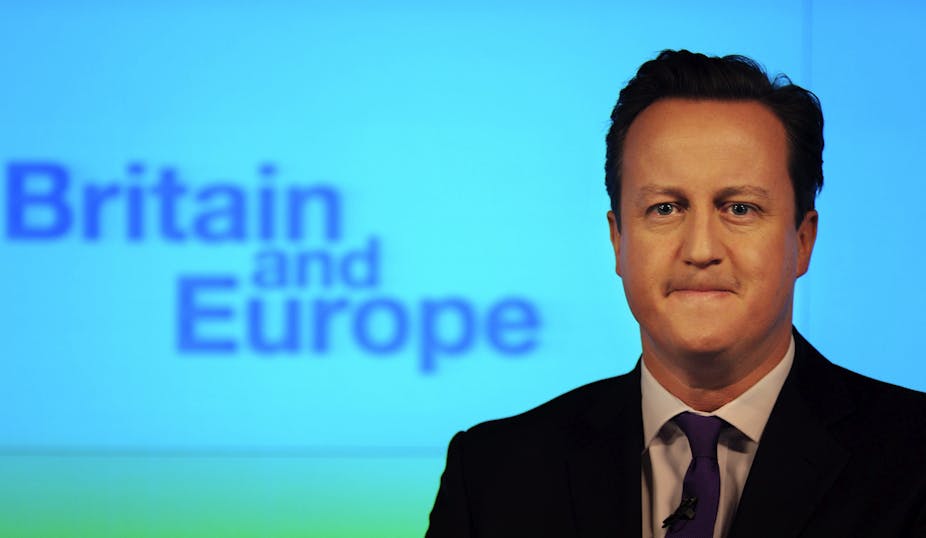The threatened renegotiation of Britain’s place in the European Union is considered by many to be a gamble for the UK. Forty years after the UK’s entry into the European Economic Community, this declaration places the UK at a crossroads, much like it did in the successful referendum of 1975.
This is not the first time the UK has expressed its dissatisfaction with its place in the European Economic Community. In 1990, then Tory leader Margaret Thatcher unequivocally stated her objections to the European community when she made her No! No! No! speech to the Commons. David Cameron has finally buckled to internal Tory pressure and put a referendum on the table for British citizens to decide on remaining in or out of the European Union. His concern was that deep disillusionment with the EU was at “an all-time high”.
The economic danger of such an exercise is apparent and, while the referendum has been postponed until the election campaign for 2015, it has already sent out nervous signals and put the finance and stock markets on notice. The UK’s economic standing is significant within the EU: it is the fourth-largest trading partner to both Germany and France and the second largest within the EU. According to the Italian financial daily Il Sole 24 Ore, the idea of a British exit from the EU bring concern to organisations such as the Confederation of British Industry (CBI), which continues to rally around the importance of the single market.
Martin Sorrell, chief executive of the WPP Group, stated: “If I’m looking at it from the point of WPP, it is not good news … This is a political decision. This is not an economic decision. You added another reason why people will postpone investment decisions … the last thing we need is people postponing more”.
But Sorrell was not alone in voicing his concern. Others included Virgin founder Richard Branson, who publicly warned Cameron of the “dangerous” consequences for the British economy of seeking a complete renegotiation of the relationship with the EU". Another unidentified business leader commenting at Davos said: “Britain will not leave the European Union, it won’t happen. How can a country which does 50% of its trade with Europe pull out? This is just politics.”
Prime Minister in-waiting at the next elections, Ed Miliband, commented in the parliament: “He [Cameron] is going to put Britain through years of uncertainty and take a huge gamble with our economy … He is running scared of UKIP (the anti-EU UK Independence Party), he has given in to his party and he can’t deliver for Britain”.
The mere threat of leaving the European Union raises concerns for the UK and the EU, particularly as Britain is at risk of falling back into recession in 2013. Britain’s departure will mean a loss of power for an entity such as the European Union. It may lose negotiating power on larger platforms such as the World Trade Organisation, and London may even suffer as the financial capital of the Europe and the world. Industrial investors in Britain might be more reluctant to invest in Britain if there is a significant possibility that there could be a vote on EU membership that could result in an exit according to Tom Raines, the Europe coordinator at the Chatham House think-tank.
What Cameron presented as a condition was the fact that the single market was, in the British view, the limit of UK’s view of European integration. For other member states, stronger integration was also one of causes of the Eurozone crisis. This included the formation of an EU banking union, fiscal integration and harmonisation. For the European Union, this scenario of a possible exit of the UK is without precedent. It is another unwanted distraction as the EU works hard at establishing Eurozone stability with the expectation of the need for new measures to enhance integration. While some member states have had enough of the UK’s antics, it would be a sign of weakness, disunity and loss of power and prestige to lose the UK from the EU.
Even the threat of the UK’s isolation from the European Union might be the wrong message anyone wants to hear at this time of great uncertainty in Europe. Many within European Union circles were disappointed but not surprised and are tired of the UK antics. Secretly, some would dearly love to see the UK leave. Attitudes to Cameron have hardened since he wielded a veto of a revision of the Lisbon treaty at a European Union summit late in 2011.
Cameron has been warned of the dangers that an EU exit could present to Britain’s economic standing. Nevertheless, the referendum provides an opportunity for him to renegotiate the terms of Britain’s EU membership; the repatriation of powers to London is on the top of Cameron’s list of demands. Cameron’s threat of a UK exit may be a tactical ploy, but at a time of great uncertainty, it’s hardly a message that the rest of the EU wants to hear.

